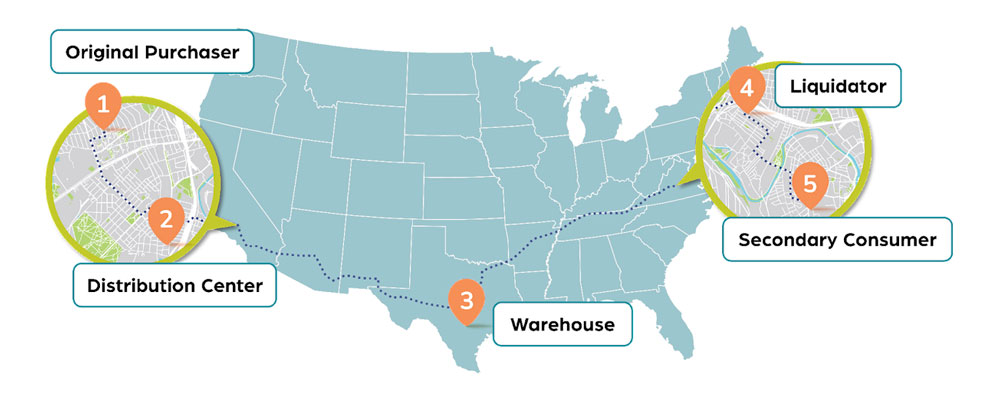The Environmental Impacts of Hyper-Local Logistics
Furniture World News Desk on
2/5/2024
By Jorja Leavitt
Our previous article explored how furniture and bedding retailers embrace hyper-local logistics to turn customer return challenges into profitable opportunities. Now, let's delve into the positive environmental impacts these innovative logistics strategies are fostering.
Environmental Impact of Logistics
The logistics sector plays a substantial role in global carbon emissions, accounting for 60% of the world's total carbon output. The traditional return process for large items like couches can be cumbersome, expensive, and environmentally taxing, involving significant carbon emissions. Once the item is finally on its way back, it may travel hundreds or thousands of miles, potentially crisscrossing states, contributing significantly to carbon emissions.

Imagine a single couch journeying this great distance, only to end up in an overburdened return center, where processing inefficiencies and high costs are the norm, averaging 59% of the item's original price. This convoluted process poses a high risk of damage to the item. It contributes to the mounting environmental issue of billions of pounds of returns in landfills.
Addressing this issue calls for a new way of thinking. Hyper-local logistics drastically cuts the transportation demands for oversized returns by facilitating the quick rehoming of items within the community.
Hyper-Local Logistics: A Greener Path for Furniture Returns
Companies adopting hyper-local logistics, similar to the approach used by Sharetown, leverage local networks and resources. This strategy significantly reduces transit distances, cuts emissions, and minimizes the overall environmental footprint of returns. Such practices exemplify how localizing the return process can yield substantial ecological benefits.
- Easy Return Initiation: Customers enjoy a straightforward online process for quick return approvals.
- Local Pickup Arrangement: Sharetown coordinates with local teams for faster pickup, reducing customer wait times.
- Reduced Transit Distance: Items travel shorter distances to nearby centers, drastically lowering emissions.
- Efficient Processing: Faster, localized processing accelerates inspection and resale or donation of items.
- Minimized Waste and Eco-Friendliness: The reduced likelihood of damage during shorter transit promotes item reuse and less landfill waste.

Enhancing Environmental Impact with a More Comprehensive Approach
Hyper-local logistics models, utilizing nationwide networks, offer several benefits to environmental sustainability:
-
Significant Reduction in Miles Traveled: For example, a couch that might have traveled 500 miles in a traditional return process could now travel only about 30 miles, leading to a drastic reduction in carbon emissions.
-
Use of Personal, More Eco-Friendly Vehicles: Harnessing a network of local drivers using more fuel-efficient and eco-friendly vehicles than traditional logistics trucks, significantly lessens the environmental impact.
-
Extended Product Lifecycles: By minimizing transit damage and facilitating local resale or donation, such models help prolong the life of furniture items, thereby reducing waste accumulation in landfills.
-
Community-Centric Eco-Practices: Localizing logistics enhances community involvement and eco-responsibility, supporting local economies and encouraging sustainable consumption and waste management practices.
This hyper-local model signifies a leap in eco-friendly logistics and marks a pivotal shift towards a more sustainable, community-driven future in returns.
A Sustainable Step Forward
Hyper-local logistics demonstrates the potential of thoughtful, innovative, and collaborative strategies in mitigating environmental challenges. By integrating community participation with sustainable methods, this model contributes meaningfully to reducing carbon emissions and waste in the furniture sector. It encourages businesses and consumers to adopt more sustainable practices, leading towards a more environmentally conscious and responsible approach to product returns.
About the Author
Jorja Leavitt is the Co-Founder and COO of Sharetown, a sustainable all-in-one; reverse logistics, overstock, and recommerce solution for brands that sell oversized items such as furniture, mattresses, and exercise equipment. Established in 2012, Sharetown’s innovative approach to streamline returns from in-home pickup to resale has helped leading brands recover costs, maximize revenue, and improve customer satisfaction. For more information, visit sharetown.com Jorja can be reached at jorja@sharetown.com